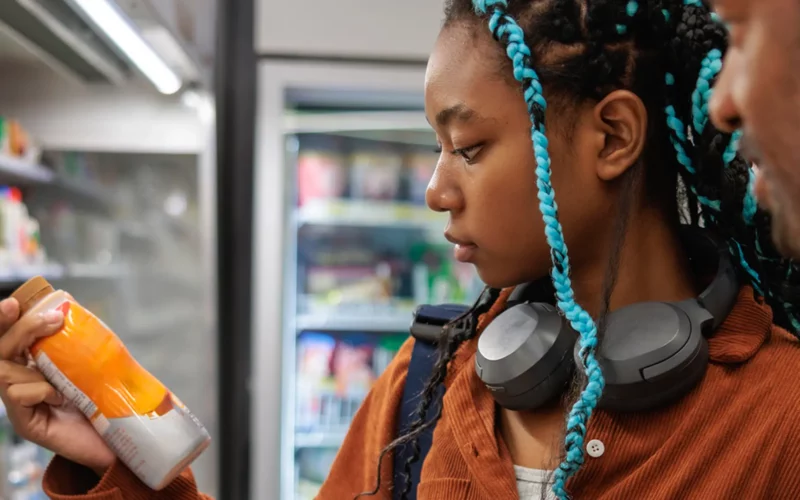Sugary cereals. Colorful drinks. Frozen dinners. For millions of busy parents, these quick, packaged foods seem like easy options to feed their families. But behind the colorful labels, these foods are filled with sugar, salt and chemicals that are harmful for growing kids and have been linked to Type 2 diabetes.
In 2021, more than 15 million children in the U.S. aged 5 to 14 were overweight or obese (The Lancet, 2024). At the same time, the number of kids being diagnosed with diseases like Type 2 diabetes is rising rapidly.
Researchers now link these trends to the rise of ultra-processed foods (UPFs). Packed with additives and ingredients you don’t recognize, UPFs are showing connections to serious, long-term health problems.
Imagine a 10-year-old girl diagnosed with Type 2 diabetes. Her daily snacks included yogurt tubes, cereal bars, and crackers; snacks her mom chose because the labels said things like “low fat,” “whole grain,” or “made with real fruit.” Her mom thought she was making healthy choices. But all of those snacks were UPFs loaded with sugars and additives.
Stories like this are becoming more common as families discover the hidden risks of UPFs. We’ll break down what these foods are and how they can hurt kids.
What are ultra-processed foods?
UPFs are made using ingredients you wouldn’t cook with at home. These foods are created in labs to last longer, taste better, and make you crave them more. Think of the difference between grilling a burger patty made from ground beef versus heating up a frozen microwave burger. One uses simple, fresh ingredients; the other is packed with chemicals to create flavor and increase shelf life.
Common UPF examples
- Sugary breakfast cereals and flavored yogurts
- Soda and energy drinks
- Chips and snack bars
- Frozen meals and instant noodles
- Processed meats like hot dogs and jerky
Are UPFs unhealthy?
UPFs are made to taste good and last a long time. But they don’t give kids the nutrients they need to grow healthy and strong.
What makes them bad?
- Too much sugar, salt and fat can damage the heart, liver and blood vessels over time
- These foods are low in fiber, protein and essential vitamins that kids need to grow
- Some additives used in UPFs may harm your digestive system
- Many UPFs are designed to block the body’s natural “ I’m full” signals, making it easier to overeat without realizing it
What health problems are linked to UPFs?
These foods aren’t just unhealthy. They can also lead to serious disease. Researchers from trusted institutions like the National Institutes of Health (NIH) and Harvard have found clear links between UPFs and long-term health issues in kids.
Type 2 diabetes
- UPFs raise blood sugar and wear out the body’s insulin response
- Kids who eat a lot of UPFs have a higher chance of developing Type 2 diabetes (Nutrients, 2024)
Fatty liver disease (NAFLD & NASH)
- Sugar and fat can build up in the liver, even in kids
- Teens who ate the most UPFs were twice as likely to have fatty liver disease (Hepcomm, 2023)
Other possible health problems
- Heart disease
- High blood pressure
- Certain cancers
- Parkinson’s and cognitive decline
Why are UPFs everywhere?
If UPFs can lead to these diseases, why are they in nearly every grocery store, corner market and school vending machine? The short answer: they’re cheap, easy to make and can sit on shelves for years.
Ultra-processed foods are built for convenience. They’re made with low-cost ingredients, making them cheaper to buy and easier to prepare than fresh food. For busy families juggling jobs, school and sports, these foods can feel like the best choice (ScienceDirect, 2024).
Big food companies also spend billions of dollars on ads aimed at parents and kids. They use cartoon mascots, bright packaging, and words like “wholesome” or “real fruit” to make these products sound healthy. These foods are everywhere by design. They were made to be easy, addictive, and hard to avoid, especially for working families trying to get through the day.
How do UPFs affect families?
Making real food choices isn’t always easy. Especially when time, money, and energy are already stretched thin. But when a child is diagnosed with a serious condition like Type 2 diabetes or fatty liver disease, everything changes.
For families, that can mean
- Expensive medications and ongoing medical care
- Strict diet changes that affect every meal and grocery trip
- Missed work for doctor visits, missed school for the child
- Daily stress, confusion, and guilt over what went wrong
Many parents feel blindsided. They trusted the labels and packaging that claimed “no artificial flavors” and “made with real ingredients”. They thought they were making good choices. But these foods were designed to be misleading and addictive.
What is the U.S. government doing about UPFs?
With UPFs linked to serious health issues in kids, why isn’t the government stepping in?
Right now, there is no legal definition of ultra-processed food in the U.S. With interest growing in regulating these foods (NYT, 2025), there is progress underway:
- The 2025 dietary guidelines committee is reviewing new research on UPFs and child health (USDA)
- The FDA is re-evaluating old food additives, many of which were approved decades ago
- Proposals are on the table to cut sodium and require clearer labels for sugar and salt (Congress.gov)
- The Make America Healthy Again Commission was created to recommend new standards and public health protections around diet-related illness (White House).
How can you avoid UPFs?
While the government is still catching up, families don’t have to wait for policy changes to make healthier choices. Small steps can make a big difference by starting with what you buy at the store.
Simple ways to cut back
- Read ingredient labels and avoid foods with long lists and unfamiliar words
- Make meals with whole foods like fruits, vegetables, beans, eggs, chicken or fish
- Make easy swaps:
- Swap cereal for plain oats or yogurt with fruit
- Swap chips for popcorn or nuts
- Swap sodas and sports drinks for water, milk, or unsweetened tea
You don’t have to be perfect, just try to be more consistent. These changes can help protect your child’s health today and in the future.
If my child has Type 2 diabetes, what should I do?
If your child has been diagnosed with Type 2 diabetes, fatty liver disease, or heart problems after years of eating processed foods, you’re not alone, and you’re not to blame.
Many families were misled by labels and marketing that made these foods seem healthy.
Our partner Justpoint PLLC is actively investigating these claims, and it’s free to see if you qualify. Justpoint PLLC helps parents with qualified cases take legal action against the companies that put profits before children’s health.
This article is for educational purposes only and does not constitute medical advice. Individual nutritional needs vary. Please consult a qualified healthcare professional for personalized guidance.



